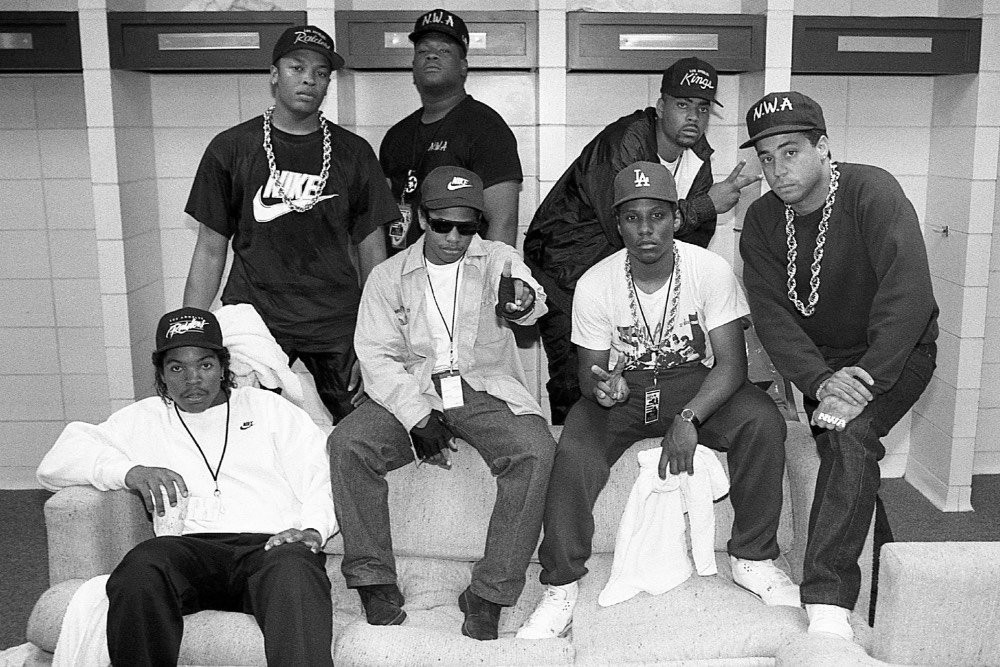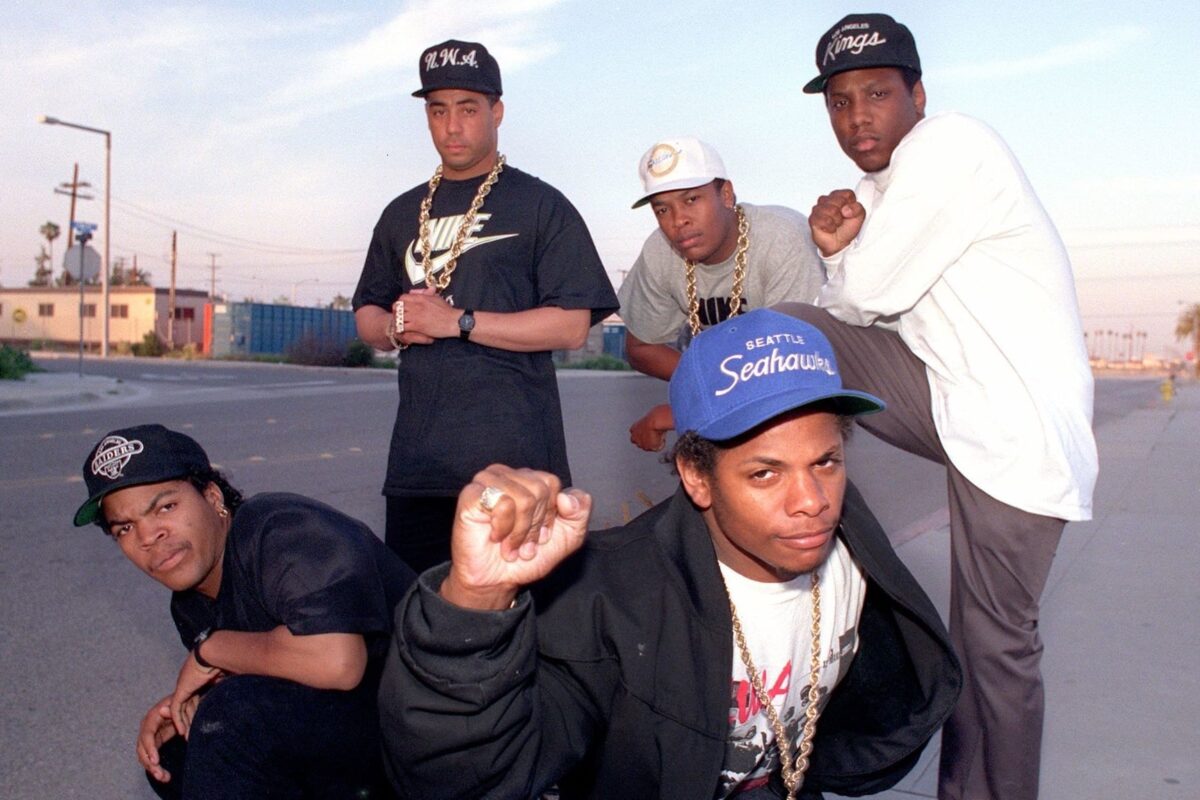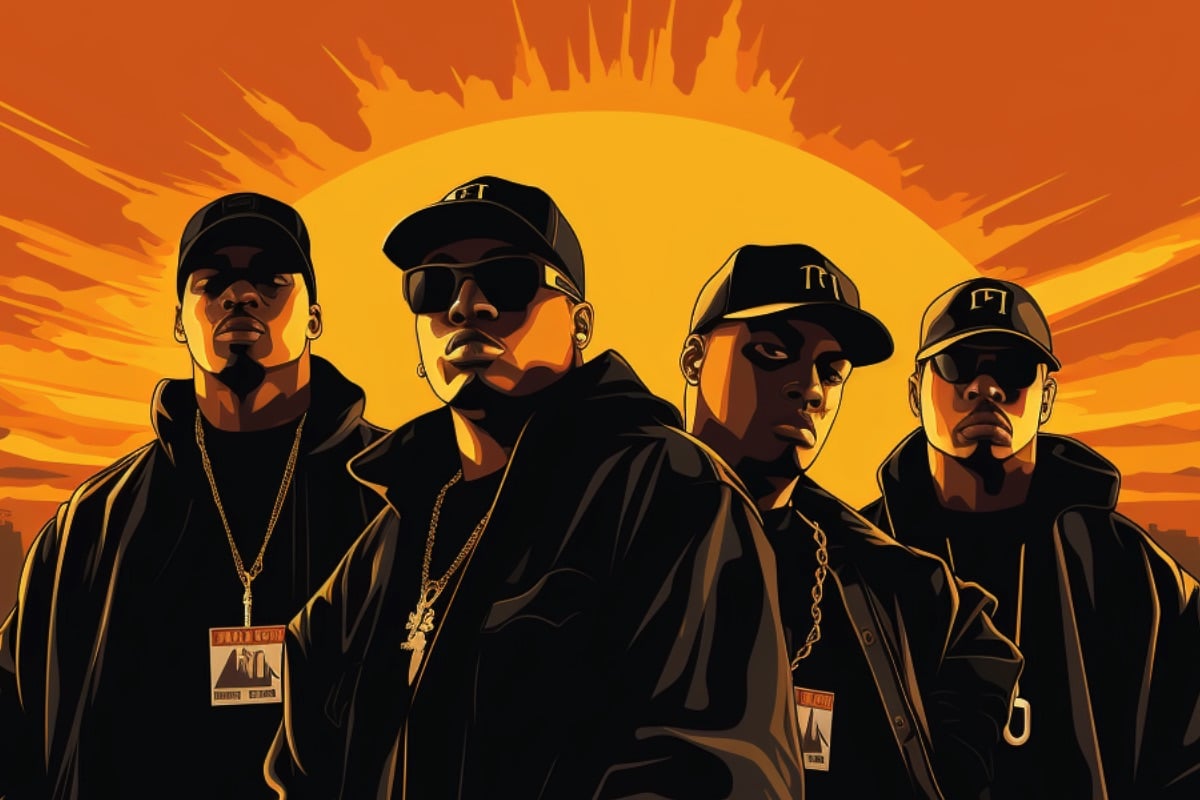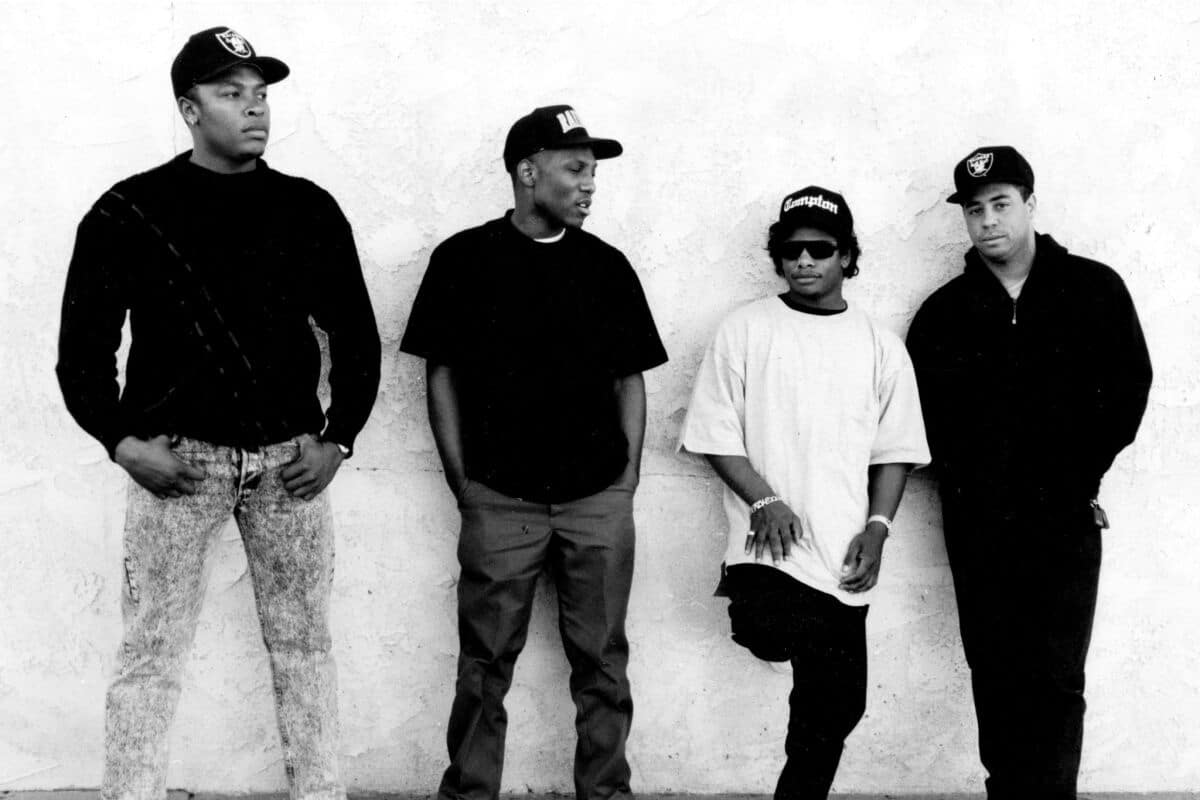In the realm of West Coast gangsta rap, few names resonate as profoundly as N.W.A. – a supergroup emerging from the streets of Compton in 1987. Comprising the raw talents of Eazy-E, Dr. Dre, Ice Cube, and MC Ren, with the later addition of DJ Yella and The D.O.C., this ensemble didn’t just play music; they detonated cultural bombs with every track they dropped. From their debut “Dope Man / 8-Ball” to the seismic impact of “Straight Outta Compton,” N.W.A. wasn’t just a musical act; they were the audacious voice of a restless generation, unafraid to stir the pot and confront the status quo.
Eazy-E, the ambitious drug dealer-turned-music mogul, teamed up with production titan Dr. Dre and the gifted writer Ice Cube, alongside local club operator MC Ren, to form a group that would go beyond music. Their early work, including the provocative “The Boyz-N-The Hood,” was a harbinger of the raw, unfiltered narratives that would come to define their style. The group’s first album, “N.W.A. and the Posse,” was merely a prelude to the incendiary “Straight Outta Compton” – an album that sold triple platinum and thrust the group into a vortex of controversy and acclaim.
The group’s aggressive and confrontational style, particularly evident in tracks like “Fuck Tha Police,” sparked boycotts and a national debate. Their music was a mirror to the societal tensions of the time, reflecting issues that many would rather ignore. Ice Cube’s departure over a contract dispute marked a significant shift, but the group persisted, releasing “100 Miles and Runnin’” and their final record “Efil4Zaggin” [Niggaz4Life]. Dr. Dre’s eventual exit, allegedly spurred by threats from Suge Knight, marked the end of an era.
Each member’s path post-N.W.A. was as diverse as their music. Dr. Dre’s solo career skyrocketed, creating a legacy that extended far beyond his N.W.A. days. Ice Cube’s foray into music and film solidified his status as a cultural icon. MC Ren and DJ Yella’s solo endeavors, though less impactful, were still noteworthy. Tragically, Eazy-E’s life was cut short in 1995 due to AIDS, but his influence and contributions to the music industry remain indelible.

N.W.A.’s impact on hip hop and pop culture cannot be overstated. Despite the lack of mainstream accolades or radio airplay, their message reached the furthest corners of the nation, reshaping the landscape of hip-hop forever. Albums like “Straight Outta Compton” and “Niggaz4Life” achieved monumental success, with the former hitting number thirty-seven on the U.S. Billboard 200 and the latter reaching number one. Their raw depiction of life in the streets and bold confrontation of societal issues made them icons, admired and controversial in equal measure.
Andre Young, better known as Dr. Dre, is perhaps the most iconic member of N.W.A. Born in Compton, a place marred by economic decline and social unrest, Dre’s early exposure to music was diverse and profound. His household was filled with the sounds of soul and funk legends, and by age ten, he was already exploring the relationship between music and emotion, laying the groundwork for his future innovations in music production. Influenced by the likes of George Clinton’s Parliament and Funkadelic, Dre’s “G-Funk” sound would come to define a significant era in hip-hop music.
Dre’s journey in the music world began in earnest after a transformative experience at a Run DMC show. Joining the World Class Wreckin’ Kru and adopting the moniker Dr. Dre, he quickly established himself as a premier DJ in Los Angeles. His early work, including hits like “Surgery” and “Juice,” captured the electronic funk sound that would become his signature.
Meanwhile, Ice Cube, born O’Shea Jackson, was navigating his own path. A scholar and athlete from South Central who attended high school in the suburbs, Cube’s foray into rap began with his group C.I.A. and later at the pivotal Eve’s After Dark club, where he met Dre and Eazy-E. This convergence of talent and ambition was the genesis of N.W.A.
Eric Lynn Wright, or Eazy-E, was the wildcard of the group. A former drug dealer from Compton, Eazy-E’s vision to create a “supergroup” was as audacious as it was prescient. His business acumen and relentless drive were critical in bringing together the likes of Dre, Cube, MC Ren, and DJ Yella to form N.W.A.
The group’s early work, including tracks like “8-Ball” and “Dope Man,” was a showcase of their raw talent and uncompromising vision. “N
.W.A. and the Posse,” featuring tracks like “Fat Girl” and “Drink It Up,” displayed their versatility and humor, a counterpoint to their more serious, hard-hitting narratives.
N.W.A.’s music was a reflection of their environment – a response to the gang violence, the crack epidemic, and the systemic racism that plagued their communities. Their work was more than just music; it was a cultural statement, a form of protest against a society that seemed to have forgotten them. Tracks like “Fuck Tha Police” were born from real experiences of police brutality and racial profiling, making their message resonate with a generation that felt marginalized and voiceless.
The success of “Straight Outta Compton” was unprecedented. With no radio publicity, it went gold in six weeks and ultimately sold millions of copies. The album was a cultural phenomenon, capturing the frustrations and aspirations of a generation. Its raw depiction of life in Compton and its unapologetic confrontation of societal issues made it a landmark in hip-hop history.

However, N.W.A.’s journey was not without its controversies. The group’s lyrics often glorified violence, misogyny, and criminality, sparking widespread criticism and debate. Their portrayal of women and their engagement in violent altercations, such as Dr. Dre’s assault on a female television host, were indicative of the darker aspects of their legacy.
Despite their turbulent history and the eventual disbanding of the group, N.W.A.’s influence on hip-hop and pop culture is undeniable. Their legacy lives on through the solo careers of its members, particularly Dr. Dre and Ice Cube, who have continued to shape the music industry and pop culture in significant ways.
In retrospect, N.W.A.’s emergence and evolution were a reflection of the times – a response to the racial, social, and economic tensions of late 20th century America. Their music was a form of rebellion, a way for a marginalized community to voice their frustrations and aspirations. N.W.A. was more than just a hip-hop group; they were a cultural phenomenon that challenged the status quo and paved the way for future generations of artists to speak their truth.
Would you like to learn more? Dive deeper into the depths of N.W.A. in our featured articles below.






